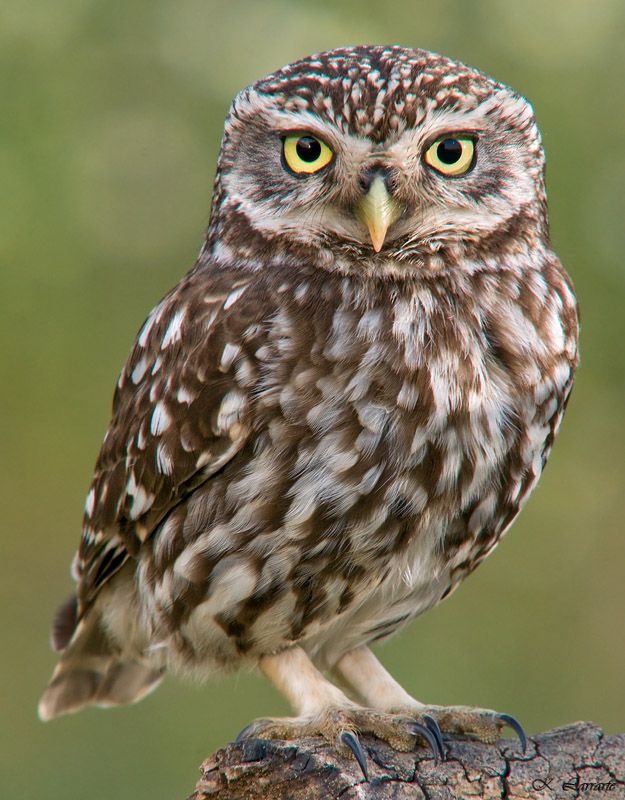Have you ever heard a soft, whistling call in the British countryside at dusk? It might just be the UK's smallest owl, the charming little owl. This diminutive predator, with its piercing yellow eyes and expressive brows, holds a unique place in the UK's avian tapestry. This article explores the life and challenges of this captivating creature.
The little owl, scientifically known as Athene noctua, is a non-native species introduced to the UK in the late 19th century. Despite its relatively recent arrival, it has become a familiar sight, often perched on fence posts or telegraph poles, surveying its surroundings with an air of quiet authority. It's a bird that evokes a sense of wonder and embodies the wild spirit of the British countryside.
Initially introduced for ornamental purposes, the little owl population quickly expanded, adapting remarkably well to the UK's diverse habitats. From farmland and woodland edges to urban parks and gardens, these adaptable birds carved a niche for themselves. Their ability to thrive in a range of environments speaks to their resilience and resourcefulness.
Understanding the little owl's place in the UK's ecosystem requires a look at its diet and hunting behaviour. Primarily insectivorous, these owls feast on a variety of invertebrates, including beetles, earthworms, and moths. They also supplement their diet with small mammals, such as voles and mice, making them valuable allies for farmers in controlling rodent populations.
Despite its apparent success, the little owl faces various threats. Habitat loss due to intensive agriculture and urban development is a significant concern. The use of pesticides can also impact their prey base, affecting the owl's food supply. Road traffic collisions are another hazard, particularly for young owls dispersing from their natal territories.
The little owl's history in the UK is a fascinating case study of introduced species. Originating in continental Europe, these birds were brought to the UK by enthusiastic landowners, quickly establishing themselves as a resident breeding species. Their introduction, though intentional, has had lasting impacts on the British landscape, highlighting the complexities of species introductions and their ecological consequences.
The little owl holds ecological importance as a predator of invertebrates and small mammals, contributing to the balance of the food web. Its presence also enriches the biodiversity of the British countryside, adding a touch of magic to the rural landscape.
One benefit of the little owl is its role in controlling pest populations, benefiting farmers and gardeners alike. Another advantage is its contribution to biodiversity, adding to the richness and complexity of the ecosystem. Furthermore, the little owl serves as an indicator species, reflecting the health of the environment and highlighting potential issues like habitat degradation.
Supporting little owl populations involves preserving and creating suitable habitats. Planting hedgerows and maintaining areas of rough grassland can provide essential nesting and foraging grounds. Minimising pesticide use and promoting sustainable farming practices also contribute to a healthier environment for these owls.
Advantages and Disadvantages of Little Owl Introduction
| Advantages | Disadvantages |
|---|---|
| Pest control | Potential competition with native species |
| Increased biodiversity | Impact on prey populations |
| Indicator species | No natural predators to control population |
Best practices for promoting little owl conservation include creating nest boxes, reducing road traffic speeds in owl habitats, and raising awareness about the importance of these birds.
Challenges related to little owl conservation include habitat loss, pesticide use, and road collisions. Solutions involve creating wildlife corridors, promoting organic farming, and implementing traffic calming measures.
FAQ: Are little owls nocturnal? Primarily, but they can be active during the day, especially during breeding season. What do little owls eat? Insects, earthworms, small mammals. Where do little owls nest? Tree hollows, nest boxes, old buildings. Are little owls endangered in the UK? Their population is considered stable but faces ongoing threats.
Tips for observing little owls: look for them perched on prominent locations, listen for their distinctive calls, and respect their space by observing from a distance.
In conclusion, the little owl, though a non-native species, has become an integral part of the UK's natural heritage. Its small size, captivating appearance, and crucial role in the ecosystem make it a valuable asset. Understanding the challenges this charming bird faces, and taking steps to support its conservation, is essential for ensuring its continued presence in the British countryside for generations to come. By supporting sustainable farming practices, creating suitable habitats, and raising awareness, we can help safeguard this delightful owl and the rich biodiversity it represents. Let us all play our part in protecting this enchanting little creature and the precious environment it calls home. The future of the little owl in the UK depends on our collective efforts.
Little Owl In Flight - Trees By Bike
Pair Little Owls Athene noctua - Trees By Bike
Little Owl Athene Noctua Stock Photos - Trees By Bike
LITTLE OWL UK Stock Photo - Trees By Bike
Little Owl at the British Wildlife Peter Trimming cc - Trees By Bike
Little Owl Athene noctua - Trees By Bike
little owl in uk - Trees By Bike
little owl in uk - Trees By Bike
Little Owl Returns to Nature - Trees By Bike
The six types of owl you - Trees By Bike
Little Owl Facts Range Habitat Diet Lifespan Pictures - Trees By Bike
Little owl uk tree hi - Trees By Bike
Little Owl by Peter Garrity - Trees By Bike
Little Owl Athene noctua - Trees By Bike
Little Owl Uk Europe Stock Photo - Trees By Bike














